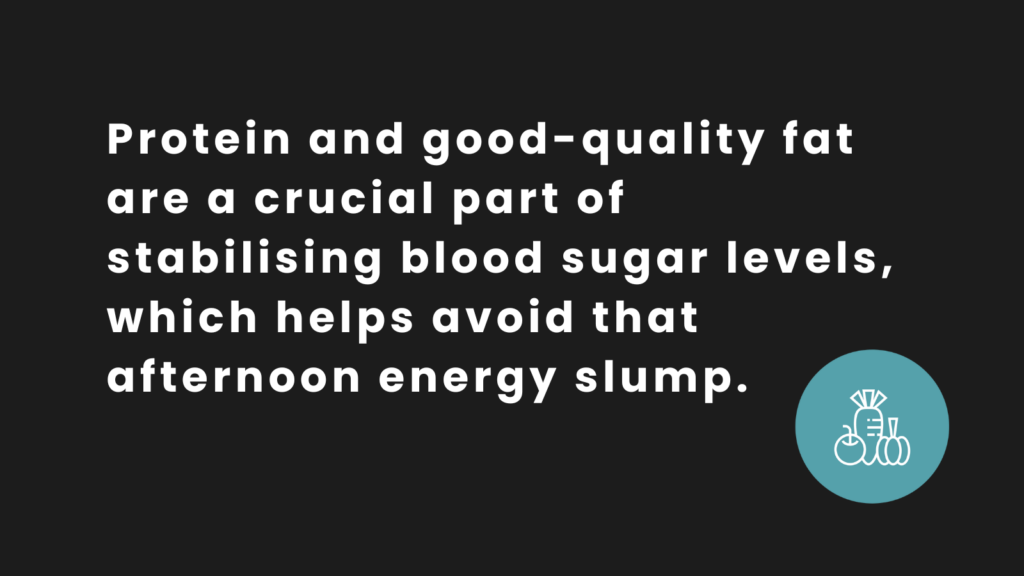Being successful often hinges on finding that elusive secret ingredient. And when it comes to workplace efficiency, that secret ingredient may be closer than you think – nutrition.
It’s no secret that what we eat directly affects our physical health, but did you know that it also plays a crucial role in our cognitive function and productivity?
From boosting focus and concentration to enhancing our mood and reducing stress levels, the impact of nutrition on workplace efficiency is undeniable.
In this article, we’ll dive deep into the connection between nutrition and productivity, exploring the foods that fuel our brains, and uncovering the best strategies to optimise our diet for peak performance.
Understanding the role of nutrition in workplace efficiency
To truly understand the impact of nutrition on workplace efficiency, we need to first grasp how our food choices affect our overall health and wellbeing.
Our bodies are intricate systems that require a balance of nutrients to function optimally. When we nourish our bodies with the right foods, we provide the necessary fuel for our brains to perform at our best.
On the other hand, a poor diet lacking essential nutrients can leave us feeling sluggish, unfocused, and prone to burnout.
Nutrition not only affects our physical health but also plays a significant role in our cognitive function. Our brains require a constant supply of energy and nutrients to function properly. By providing our brains with the right nutrients, we can enhance our focus, memory, and overall cognitive performance.
Conversely, a diet high in processed foods and sugars can lead to cognitive decline, poor memory, and reduced productivity. A study found that employees with an unhealthy diet were 66% more like to experience a loss in productivity than those who regularly ate healthily.
Additionally, nutrition plays a crucial role in regulating our mood and stress levels. Certain foods, such as those rich in omega-3 fatty acids and antioxidants, have been shown to have mood-boosting properties and can help reduce symptoms of anxiety and depression.
On the other hand, a diet high in processed foods and sugar can contribute to mood swings, irritability, and increased stress levels. By fuelling our bodies with the right nutrients, we can create a more positive and productive work environment.
How nutrition affects energy levels and productivity
One of the most noticeable ways nutrition impacts workplace efficiency is through its effect on our energy levels. We’ve all experienced the dreaded mid-afternoon slump, where our productivity takes a nosedive and our focus wavers. This drop in energy can often be attributed to what we eat or, more importantly, what we don’t eat.
When we consume a diet rich in vegetables, proteins, and healthy fats, we provide our bodies with a steady source of energy that can sustain us throughout the day. These foods are digested slowly, releasing glucose into our bloodstream at a steady pace. This helps stabilise our energy levels, preventing the sudden crashes and spikes associated with a diet high in refined sugars and processed foods.

On the other hand, a diet high in refined carbohydrates and sugars can lead to energy crashes and decreased productivity. These foods cause a rapid spike in blood sugar levels, followed by a sharp drop, leaving us feeling fatigued and unable to concentrate.
By making smart choices and fuelling our bodies with nutritious foods, we can maintain steady energy levels and maximise our productivity at work.
The connection between nutrition and mental health
In recent years, there has been a growing body of research highlighting the connection between nutrition and mental health. Our brains rely on a delicate balance of neurotransmitters and hormones to regulate our mood, emotions, and stress response.
The foods we eat play a crucial role in maintaining this delicate balance and can have a significant impact on our mental wellbeing.
A diet rich in protein, healthy fats, moderate grains, fruits and vegetables provides essential nutrients that support optimal brain function. These nutrients help produce neurotransmitters like serotonin, which is often referred to as the “feel-good” hormone.
Serotonin plays a vital role in regulating mood, and promoting feelings of happiness and wellbeing. By nourishing our bodies with the right nutrients, we can support our mental health and create a positive work environment.
Conversely, a diet high in processed foods, saturated fats, and sugars has been linked to an increased risk of mental health issues, including depression and anxiety. These foods can disrupt the delicate balance of neurotransmitters in our brains, leading to mood disturbances and decreased productivity.
By prioritising a nutritious diet, we can protect our mental health and promote a positive work-life balance.
Strategies for promoting healthy eating in the workplace
Creating a workplace environment that promotes healthy eating habits can significantly impact employee wellbeing and productivity. Here are some strategies to consider implementing in your workplace:
1. Provide healthy snacks: Stock the office pantry with a variety of nutritious snacks such as fresh fruit, nuts, yogurt, vegetables and dips. This encourages employees to make healthier choices throughout the day when they may be pressed for time.
2. Offer healthy meal options: Provide nutritious meal options in the office or consider partnering with local restaurants that offer healthy lunch choices. This makes it easier for employees to make healthy food choices even when they’re rushing.
3. Educate employees about nutrition: When employees are equipped with the knowledge about how and what to eat then they are empowered to take control of their own health and make informed decisions. Unstress Health provides employees with the knowledge to do this, not just at work but throughout all aspects of their life.
4. Encourage physical activity: Incorporate physical activity into the workday by organising walking meetings, offering standing desks, or providing access to a gym or exercise classes. Regular exercise can enhance the effects of a healthy diet by supporting blood sugar regulation and further improving workplace efficiency.
Tips for incorporating nutritious meals and snacks into the workday
While it’s essential to provide healthy options in the workplace, individuals also have a role to play in fuelling their bodies for success. Here are some tips for incorporating nutritious meals and snacks into the workday:
1. Plan and prepare meals in advance: Spend some time on the weekends planning and prepping meals for the week. This ensures that you have healthy options readily available and reduces the temptation to grab unhealthy takeout during busy workdays.
2. Pack your own lunch: Bringing your own lunch from home gives you full control over the ingredients and portion sizes. Aim for a balanced meal that includes proteins, moderate grains, healthy fats and plenty of fruits and vegetables.
3. Snack smart: Keep a stash of healthy snacks at your desk, such as cut-up fruits and vegetables, nuts, or yogurt. These nutritious snacks can help curb cravings and keep you energised throughout the day.
4. Stay hydrated: Dehydration can lead to fatigue and decreased cognitive function. Keep a reusable water bottle at your desk and consciously drink enough water throughout the day.
By incorporating these tips into your daily routine, you can ensure that you’re fuelling your body and mind for success.
The role of hydration in workplace efficiency
While we often focus on the foods we eat, it’s important not to overlook the role of hydration in workplace efficiency. Our bodies rely on water to function properly, and even mild dehydration can have a significant impact on cognitive function and productivity.
Dehydration can lead to fatigue, difficulty concentrating, and decreased cognitive performance. To stay hydrated throughout the workday, aim to drink 2L during the first 10hrs of the day and then 150mls every hour after that.
Keep a water bottle at your desk as a visual reminder to drink water regularly. If you find it challenging to drink enough water, try infusing it with fruits (lemon, strawberry, cucumber) or herbs (mint) to add flavour. A pinch of salt in your water is also a good way to consume electro
Avoid sports drinks, carbonated drinks and fruit juices. The amount of sugar in these drinks is extremely high, which causes havoc with your blood sugar levels. If you do consume them see them as a special treat, not every day or even weekly consumption.
Addressing common challenges and obstacles to healthy eating at work
While promoting healthy eating in the workplace is crucial, it’s important to acknowledge and address the common challenges and obstacles employees may face. Here are some strategies to overcome these challenges:
1. Time constraints: Many employees feel overwhelmed with their workload and find it challenging to prioritise healthy eating. Encourage employees to schedule regular breaks for meals and provide resources for quick and nutritious meal options.
2. Workplace culture: If the workplace culture revolves around unhealthy food, it can be challenging for individuals to make healthier choices. Encourage a culture of wellness by providing healthy options and promoting the benefits of a nutritious diet.
3. Lack of knowledge: Some employees may not have the necessary knowledge or skills to make healthy food choices. Offer educational resources, workshops, or cooking classes to empower employees to make informed decisions about their nutrition.
4. Limited resources: Access to healthy food options may be limited in some workplaces. Advocate for healthier options in the cafeteria or consider partnering with local vendors to provide nutritious meal alternatives.
By addressing these challenges and providing support, employers can create an environment that prioritises employee health and wellbeing.
Conclusion: embracing nutrition for workplace success
The impact of nutrition on workplace efficiency cannot be understated. By understanding how our food choices affect our physical health, cognitive function, energy levels, and mental wellbeing, we can make informed decisions to fuel our bodies and minds for success.
From incorporating nutritious meals and snacks into our workday to promoting a workplace culture that prioritises employee wellbeing, there are numerous strategies we can implement to optimise our nutrition for peak performance.
Remember, the secret ingredient for success may be as simple as the food on our plates. By embracing nutrition and making conscious choices to fuel our bodies and minds with the right nutrients, we can unlock our full potential and maximise our efficiency at work.
So, let’s prioritise our health, embrace the power of nutrition, and watch our professional lives transform. Here’s to a future filled with workplace success and well-nourished minds and bodies!





